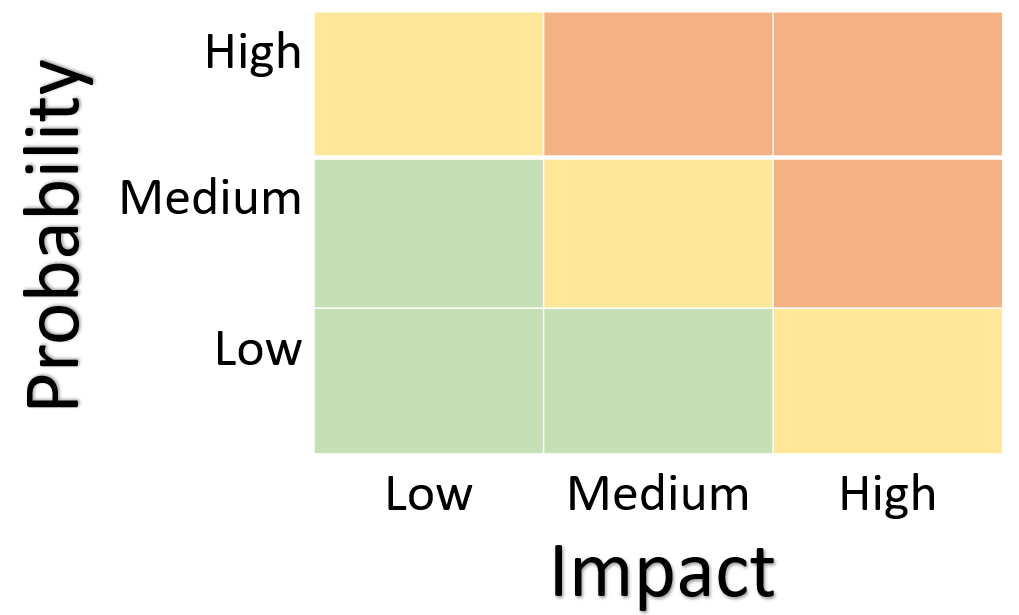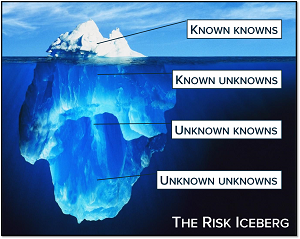By the end of this unit you should:

Listen.
You need to take responsibility for your own choices. Don't ignore problems. Solve them. When life throws a spanner at you (i.e. when a problem occurs), do something about it.

The ostrich effect is a tendency to ignore important information when we feel overwhelmed, stressed or worried.
Watch this narrated animation that explains how and why to take responsibility (7 min 24 sec).
Listen.
You need to consider future possiblities. Think what might go wrong, and then devise a plan to deal with it. Drawing on the risk assessment literature, you can use a probability-impact matrix to assess which events are worth planning for. Events with high probability and high impact should be planned for first. For example, in January of your fourth year, you need to submit a graduation thesis. You plan to write it over the Christmas and New Year break, but, what happens you catch flu? There is a low probability, but a high impact. This is easily solved by starting to write your graduation thesis earlier.

Probability-impact matrix with high-probability-high-impact areas shaded in orange.
Listen.
We are lucky because we don't have to worry about being attacked by crocodiles, or bitten by poisonous snakes, or getting robbed while walking to university. but, there are still worst-case scenarios to consider. The university has contigency plans for disasters, so your contigency plans should be at the level of individual. What events could affect you. These may relate to your financial situation, your health, your studies, your friendships and your future plans. Some worries could be what if I cannot get a job, what if I fail the programming course, and what if I cannot wake up in time for class. First, you need to assess the probability of the event, the impact of the event and then create worst-case scenario plans for the events starting with those with higher probability-impact scores.
Listen.
When a problem occurs, ideally you can solve it yourself. However, sometimes you may lack the time, resources or ability to solve it. This is when a support network can make a difference. A support network comprises the people who you can help and who can help you. For most people this will be your family and your friends. For those with little contact with family and no close real-world friends, the support network may be online. I encourage you to develop a support network within the lab. Ask for help when you need it, and offer help when someone else needs it.

Listen.
Positive psychology focuses on positive emotions and personal strengths. By focussing on these, you can be happy each day regardless of your environment. Is it not better to choose to be happy than sad?

Enjoy the song "Don't worry, be happy" by Bobby McFerrin.
Consider the events that might affect you and your studies. Do not consider disasters that affect everyone. Categorize the events, evaluate their impact and probability. State the worst-case scenario. Identify a proactive step to take.
Below is an example of a contigency plan. You only need to focus on the known knowns, as shown in the "risk iceberg".
| Category | Event | Probability | Impact | Worst-case scenario | Proactive step to take |
|---|---|---|---|---|---|
| Health | Catch cold | High | Medium | Miss deadline for submission | Complete assignments early |
| Finance | Lose part-time job | Medium | High | No money for food | Find more reliable part-time job |
| Study | Struggle in machine learning (ML) course | High | High | Fail course | Read set texts and study maths for ML before taking course |
| Life | Play online games too much | High | high | Drop out of university | Plays games at weekends only |
There is no need to submit your contigency plan, but be prepared to discuss the creation process and content.

Make sure you know the meaning of the following terms:
Make sure you have assessed the quality of your: